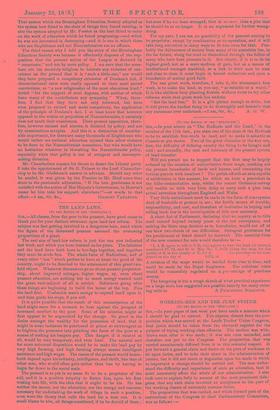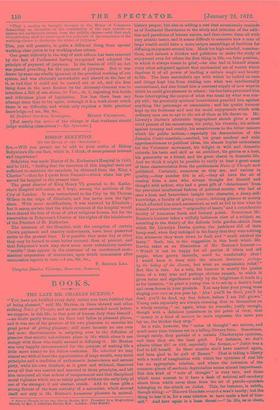WORKING-MEN AND THE JURY SYSTEM. [TO THE EDITOR OF THE
"SPECTATOR.") SIR,—In your paper of last week you have made a mistake which I should be glad to correct. You express dissent from the pro- position which was moved at the Leeds Trades' Union Congress, that juries should be taken from the electoral register for the purpose of trying working-class offences. The motion was with- drawn soon after it was made ; it was not even seconded, and therefore not put to the Congress. The proposition that was carried unanimously differed from it in this material respect. It put forward a general claim and desire on the part of workmen to sit upon juries, and to take their share in the administration of justice, but it did not insist or dogmatise upon the mode in which so important a change should be carried out. The men under- stood the difficulty and importance of such an alteration, that it must necessarily affect the whole of our administration. I also took care to explain fully to several of the most prominent dele- gates, that any such claim involved an acceptance on the part of the working classes of extremely onerous duties. The proposition that was carried, and which formed part of the instructions of the Congress to their Parliamentary Committee, was as follows :— "That a motion be brought forward in the House of Commons demanding an alteration in the constitution of the jury system—a system too exclusively drawn from the middle classes—and that such reconstitution shall be based upon the principle of the admission of the working-classes to discharge the duties of jurymen."
This, you will perceive, is quite a different thing from special working-class juries to try working-class crimes.
One great difficulty in the way of such reform has been removed by the fact of Parliament having recognised and adopted the principle of payment of jurymen. In the Session of 1870 an Act was passed providing for the payment of jurymen. But it was drawn by some one wholly ignorant of the practical working of our system, and was obviously unworkable and absurd on the face of it, so bad that it could not be carried out at all, and the first thing done in the next Session by the Attorney-General was to introduce a Bill of one clause, 34 Vict., ch. 2, repealing this feeble and ridiculous piece of legislation. Nor has there been any attempt since then to try again, although it is a work about which there is no difficulty, and which only requires a little practical knowledge.—I am, Sir, &c., 55 Bedford Gardens, Kensington. HENRY CROMPTON.
[But surely the motive of the change is that workmen should judge working-class crimes ?—En. Spectator.]



































 Previous page
Previous page